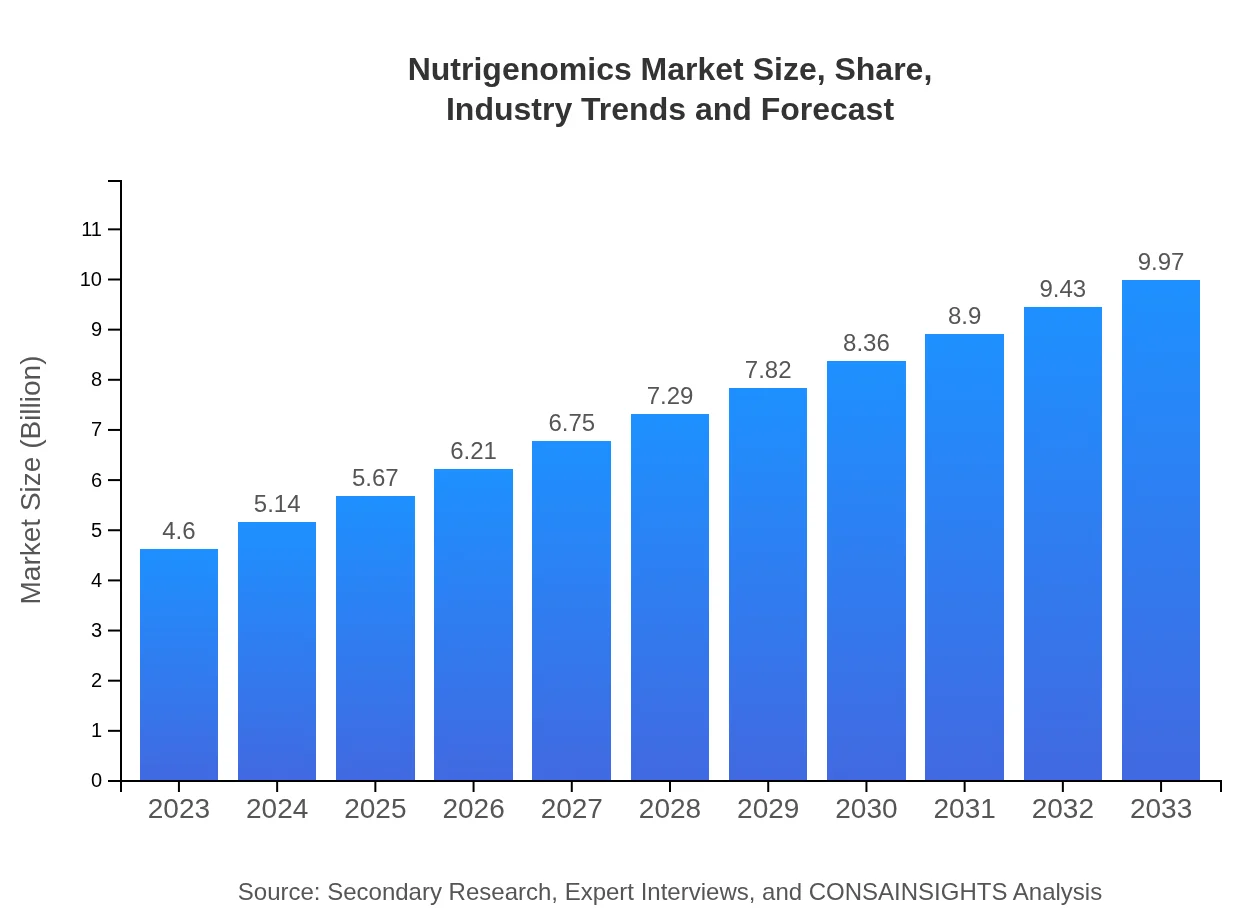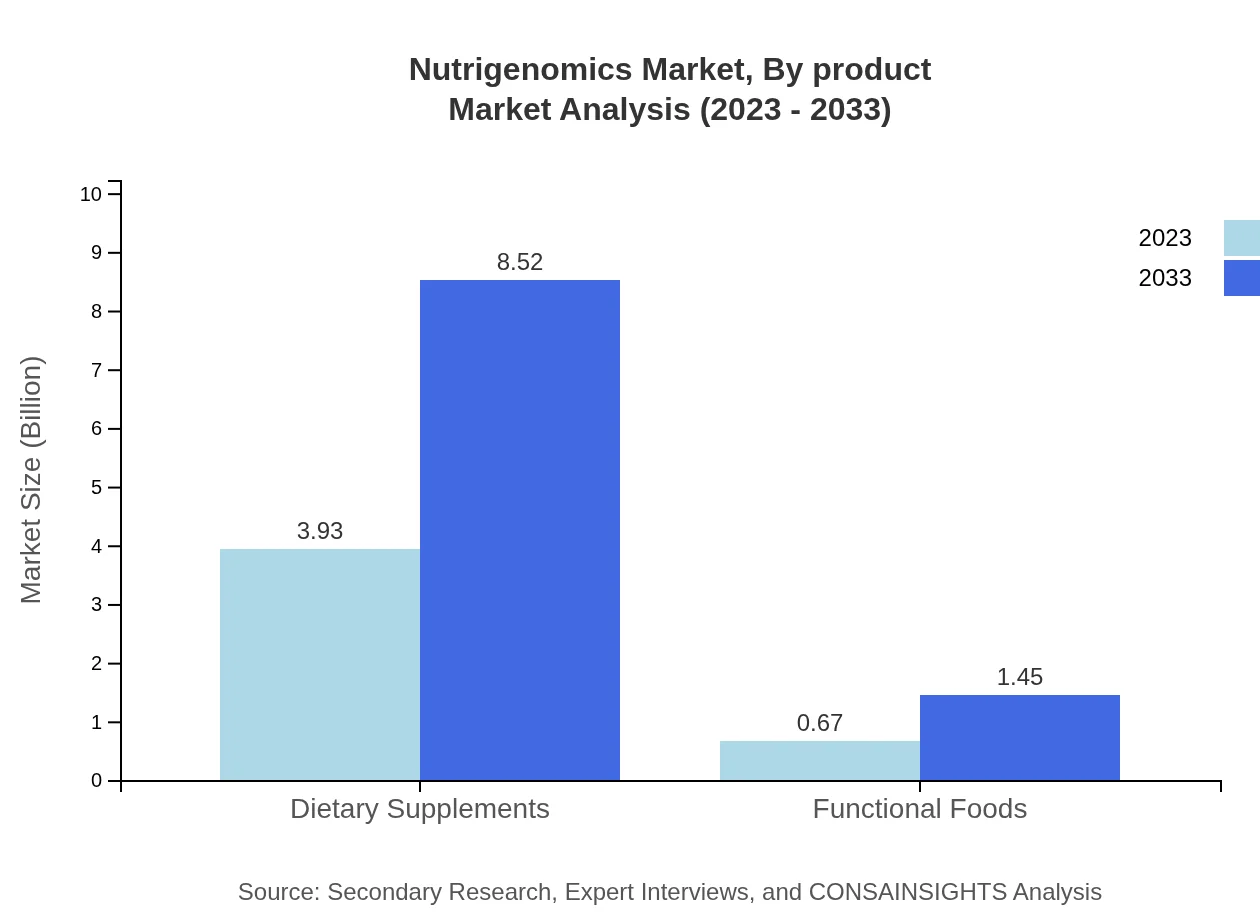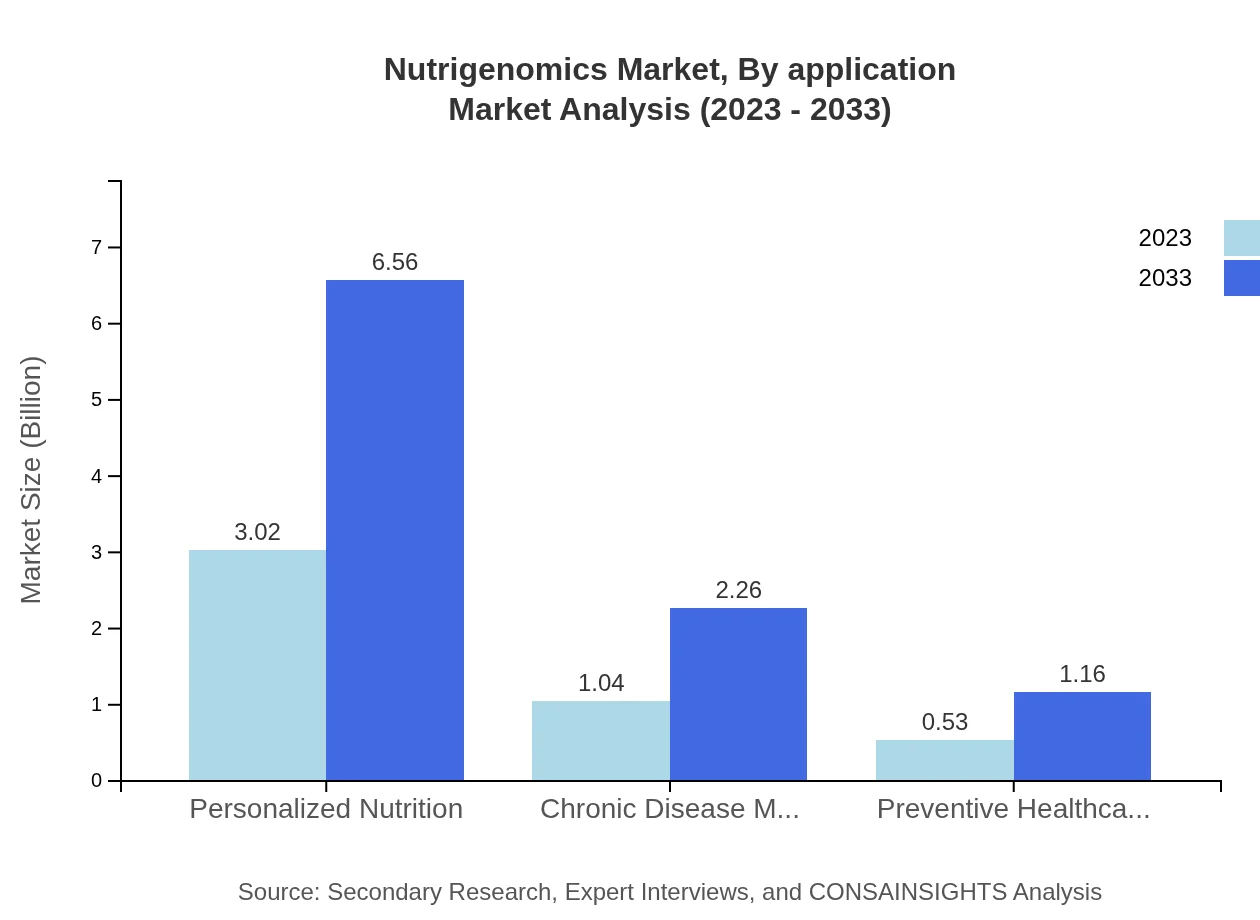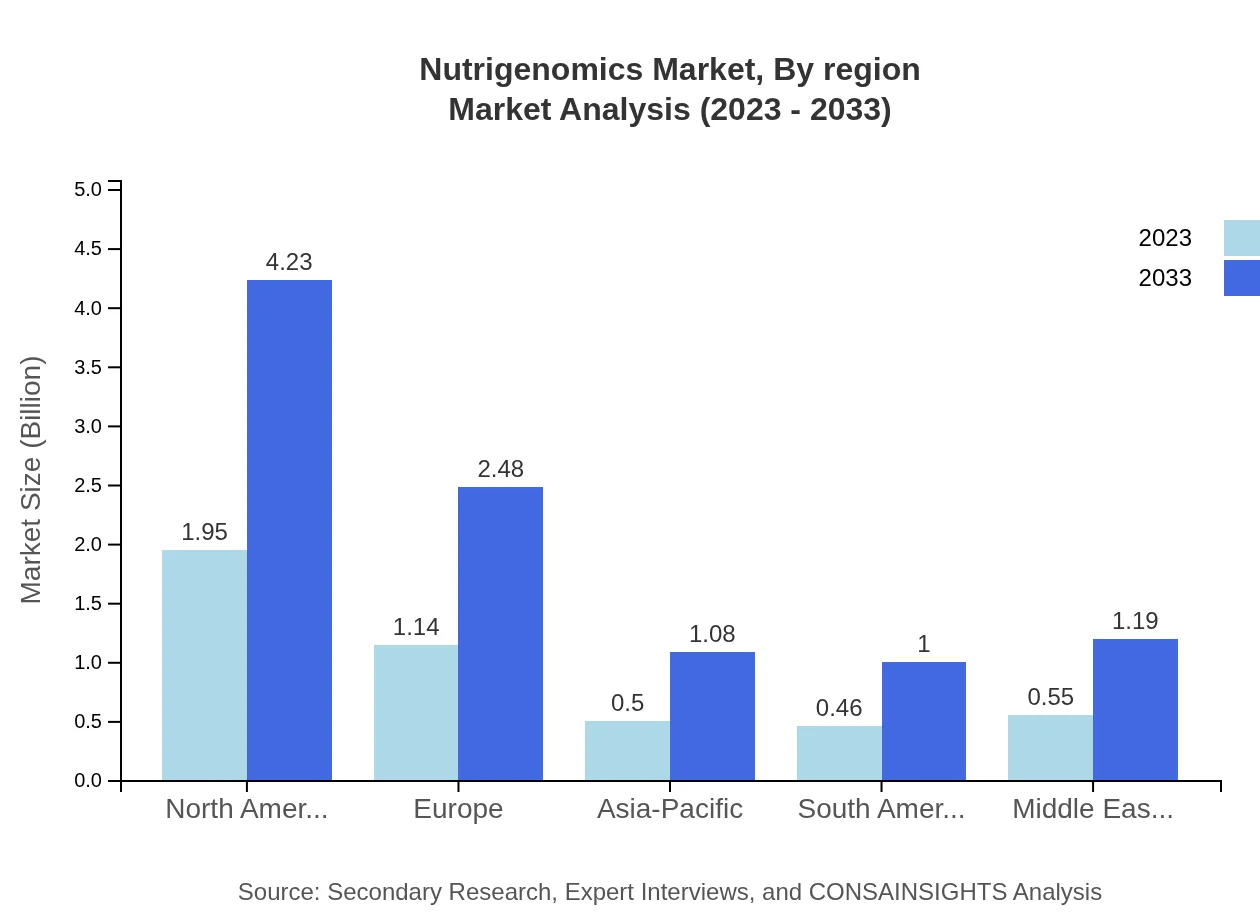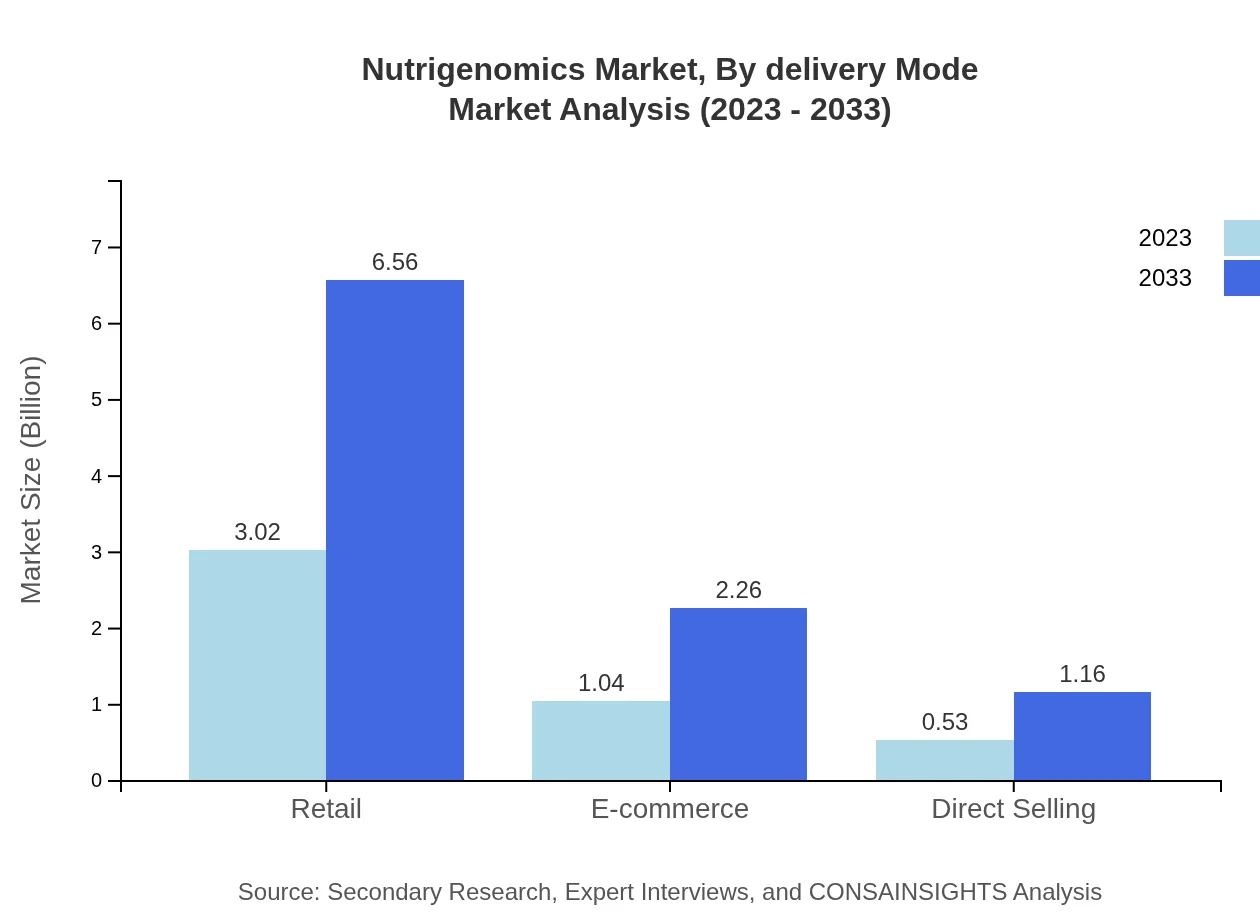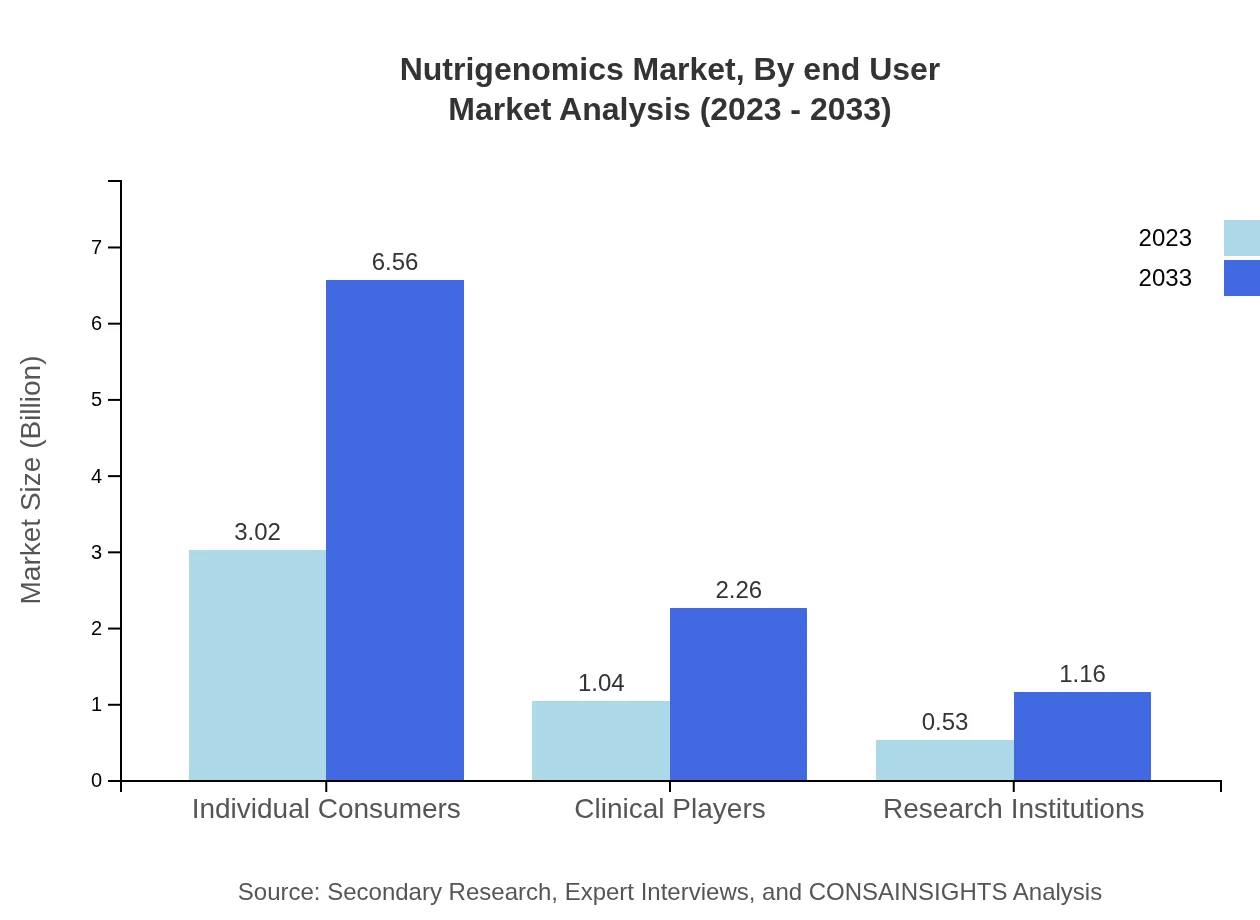Nutrigenomics Market Report
Published Date: 31 January 2026 | Report Code: nutrigenomics
Nutrigenomics Market Size, Share, Industry Trends and Forecast to 2033
This report provides a comprehensive analysis of the Nutrigenomics market, highlighting key insights, market trends, and forecasts from 2023 to 2033. It presents valuable data on market size, growth rates, industry players, and regional dynamics to aid stakeholders in strategic decision-making.
| Metric | Value |
|---|---|
| Study Period | 2023 - 2033 |
| 2023 Market Size | $4.60 Billion |
| CAGR (2023-2033) | 7.8% |
| 2033 Market Size | $9.97 Billion |
| Top Companies | Nutrigenomix, DNAfit, 23andMe, WellnessFX |
| Last Modified Date | 31 January 2026 |
Nutrigenomics Market Overview
Customize Nutrigenomics Market Report market research report
- ✔ Get in-depth analysis of Nutrigenomics market size, growth, and forecasts.
- ✔ Understand Nutrigenomics's regional dynamics and industry-specific trends.
- ✔ Identify potential applications, end-user demand, and growth segments in Nutrigenomics
What is the Market Size & CAGR of Nutrigenomics market in 2023?
Nutrigenomics Industry Analysis
Nutrigenomics Market Segmentation and Scope
Tell us your focus area and get a customized research report.
Nutrigenomics Market Analysis Report by Region
Europe Nutrigenomics Market Report:
Europe's market, valued at $1.52 billion in 2023 and expected to reach $3.29 billion by 2033, benefits from stringent health regulations that promote advanced nutritional applications based on genetic research.Asia Pacific Nutrigenomics Market Report:
The Asia Pacific region is poised for substantial growth in the Nutrigenomics market, projected to increase from $0.86 billion in 2023 to $1.86 billion by 2033, driven by rising awareness about personalized health solutions and a growing middle class interested in health and wellness.North America Nutrigenomics Market Report:
North America leads the Nutrigenomics market, with a significant valuation of $1.61 billion in 2023, anticipated to reach $3.50 billion by 2033. This growth is attributed to high consumer spending on dietary supplements and a strong research infrastructure that supports innovation.South America Nutrigenomics Market Report:
In South America, the market is estimated to grow from $0.07 billion in 2023 to $0.15 billion by 2033, influenced by increasing public health initiatives and a gradual shift towards preventive nutrition strategies.Middle East & Africa Nutrigenomics Market Report:
The Middle East and Africa show promising prospects in the Nutrigenomics market, projected to grow from $0.54 billion in 2023 to $1.18 billion by 2033, driven by increasing health awareness and a shift towards personalized healthcare solutions.Tell us your focus area and get a customized research report.
Nutrigenomics Market Analysis By Product
The Nutrigenomics market's product segmentation includes dietary supplements and functional foods. The dietary supplements segment is notably large, contributing $3.93 billion in 2023 and expected to grow to $8.52 billion by 2033. Functional foods are also critical, with sales anticipated to rise from $0.67 billion to $1.45 billion during the same period.
Nutrigenomics Market Analysis By Application
Applications in the Nutrigenomics market encompass personalized nutrition, chronic disease management, and preventive healthcare. Personalized nutrition remains the largest segment, with a market size of $3.02 billion in 2023, projected to double by 2033. Chronic disease management and preventive healthcare applications are also growing, with significant market shares that reflect the increasing prioritization of individualized dietary solutions.
Nutrigenomics Market Analysis By Region
Market analysis emphasizes the differentiated growth across various regions, illustrating North America's dominance and Europe's steady performance. Emerging markets in Asia Pacific showcase rapid growth potential as awareness increases, while South America and Africa solidify smaller but significant market shares due to rising health initiatives.
Nutrigenomics Market Analysis By Delivery Mode
Delivery modes in the Nutrigenomics market include retail, e-commerce, and direct sales. The retail channel leads with a market size of $3.02 billion in 2023, set to reach $6.56 billion by 2033, supported by traditional consumer purchasing trends. E-commerce and direct selling are rapidly expanding due to digital advancements.
Nutrigenomics Market Analysis By End User
End-user segmentation reflects diverse consumer bases, with individual consumers holding a significant share, while clinical players and research institutions contribute notably to product demand and development. The individual consumers' market size is predicted to increase from $3.02 billion to $6.56 billion in the next decade.
Nutrigenomics Market Trends and Future Forecast
Tell us your focus area and get a customized research report.
Global Market Leaders and Top Companies in Nutrigenomics Industry
Nutrigenomix:
A pioneering company specializing in genetic testing and personalized nutrition solutions, Nutrigenomix provides consumers with actionable insights based on their genetic makeup.DNAfit:
DNAfit offers unique DNA testing services that guide users in dietary and fitness choices tailored to their genetic profiles, enhancing overall health outcomes.23andMe:
Known for its innovative approach to genetic testing, 23andMe also provides wellness and trait reports, linking genetics with personalized nutrition and wellness.WellnessFX:
WellnessFX focuses on bio-individuality, providing personalized food and supplement recommendations through advanced genetic testing and data analysis.We're grateful to work with incredible clients.









FAQs
What is the market size of nutrigenomics?
The global nutrigenomics market is estimated to be valued at $4.6 billion in 2023, with a projected CAGR of 7.8%. This growth indicates increasing interest and investment in personalized nutrition driven by genetic insights.
What are the key market players or companies in the nutrigenomics industry?
The nutrigenomics industry is driven by leading firms such as Nutrigenomix, DNAfit, and 23andMe, who are pioneering genetic-based nutrition solutions. These companies significantly influence market trends and innovations.
What are the primary factors driving the growth in the nutrigenomics industry?
Growth factors in nutrigenomics include rising health consciousness, demand for personalized nutrition, and advancements in genomics technology. Increased awareness of genetic links to health also fuels market expansion.
Which region is the fastest Growing in the nutrigenomics?
The North American region is expected to see significant growth, scaling from $1.61 billion in 2023 to $3.50 billion by 2033. Europe also shows considerable growth potential, particularly in personalized health.
Does ConsaInsights provide customized market report data for the nutrigenomics industry?
Yes, ConsaInsights offers customized market reports tailored to specific needs in the nutrigenomics industry, providing in-depth analysis and data crucial for strategic decision-making.
What deliverables can I expect from this nutrigenomics market research project?
Project deliverables include comprehensive market sizing, regional insights, trend analysis, and segment performance reports. Insights will guide strategic planning and market entry decisions.
What are the market trends of nutrigenomics?
Current trends in nutrigenomics include personalized dietary recommendations, integration of genetic testing with nutrition, and a growing emphasis on preventative health strategies, aimed at enhancing individual well-being.

